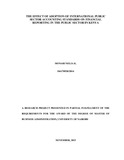| dc.description.abstract | The main purpose of the study was to establish the effect of adoption of International
Public Sector Accounting Standards on financial reporting in the public sector in Kenya.
The study was grounded on a theoretical foundation based on the stakeholder‟s theory,
organization theory of the firm and the positive accounting theory. The study employed a
descriptive survey research design. The population of study was public institutions that
had adopted accrual based IPSASs. A total of 196 non-commercial public sector
institutions were to adopt IPSASs accrual as per the data from Public Sector Accounting
Standards Board. Using simple random sampling, 32 public sector institutions were
selected for this study. Before processing the responses, the completed questionnaires
were edited for completeness and consistency. The data was then coded to enable the
responses to be grouped into various categories. Data for this study was both quantitative
and qualitative hence both descriptive and content analysis techniques were employed.
Data analysis used Microsoft excel, percentages, tabulations, means and other central
tendencies measures. Tables were used to summarize responses for further analysis and
facilitate comparison. The study established that the adoption of IPSASs was widespread
in public sector institutions in Kenya in compliance to the PFM Act 2012. The study
found out that as a result of adoption of IPSASs by the public sector entities there is
improvement in accountability, asset management and transparency on financial
reporting in public institutions. Hence this has brought about consistency in financial
reporting, enhanced decision making and has improved internal control systems.
However, the adoption of IPSASs has experienced many challenges as the
implementation cost of the system was expensive, lack of trained staff on IPSASs,
resistance to change and complexity of accrual accounting systems were among the
identified challenges experienced. The respondents were articulate in providing the
measures for mitigating the challenges experienced in adopting IPSASs. The measures
included involvement of all stakeholders in the preparation of the financial statements,
sensitization of the users for better adoption of IPSASs; training of the staff on the
relevant skills as far as adoption of IPSASs is concerned among other suggested
measures. The study made recommendations that all public institutions should adopt
IPSASs for better management, accountability and transparency of financial reporting.
IPSASs prescribes a manner in which general purpose financial statements should be
prepared to ensure comparability both with the entity‟s financial statements of previous
periods and with the financial statements of other entities. It was concluded that adoption
of IPSASs by the public sector institutions has enhanced availability of timely, relevant
and reliable financial information that has enhance decision making in the public sector. | en_US |

